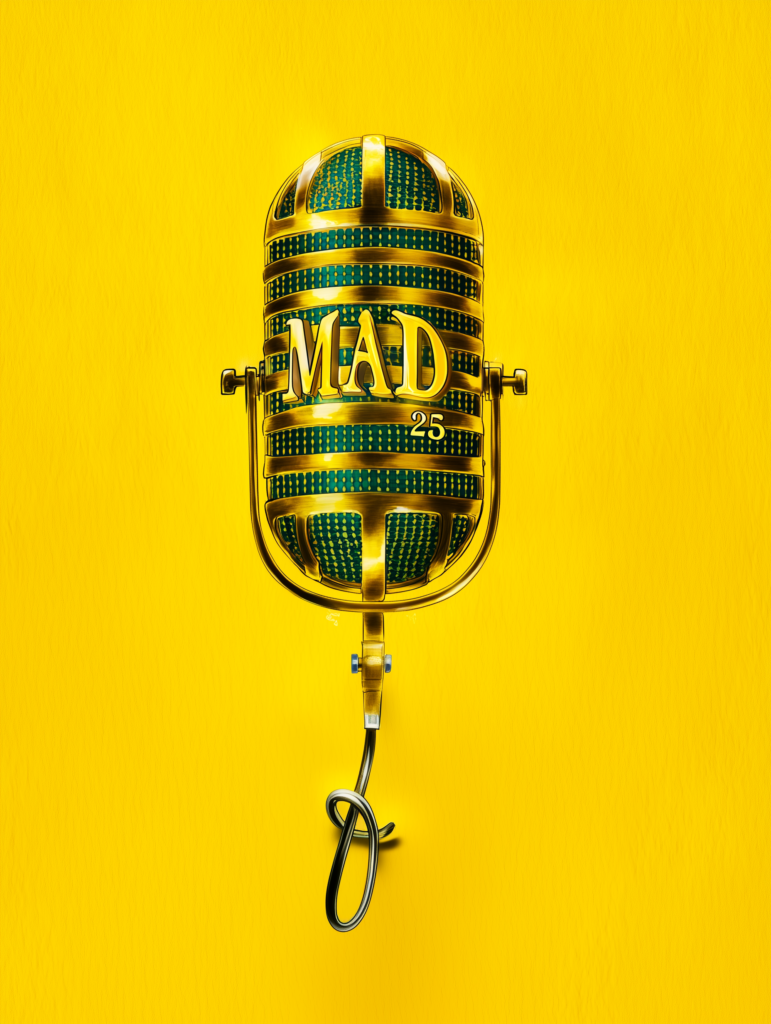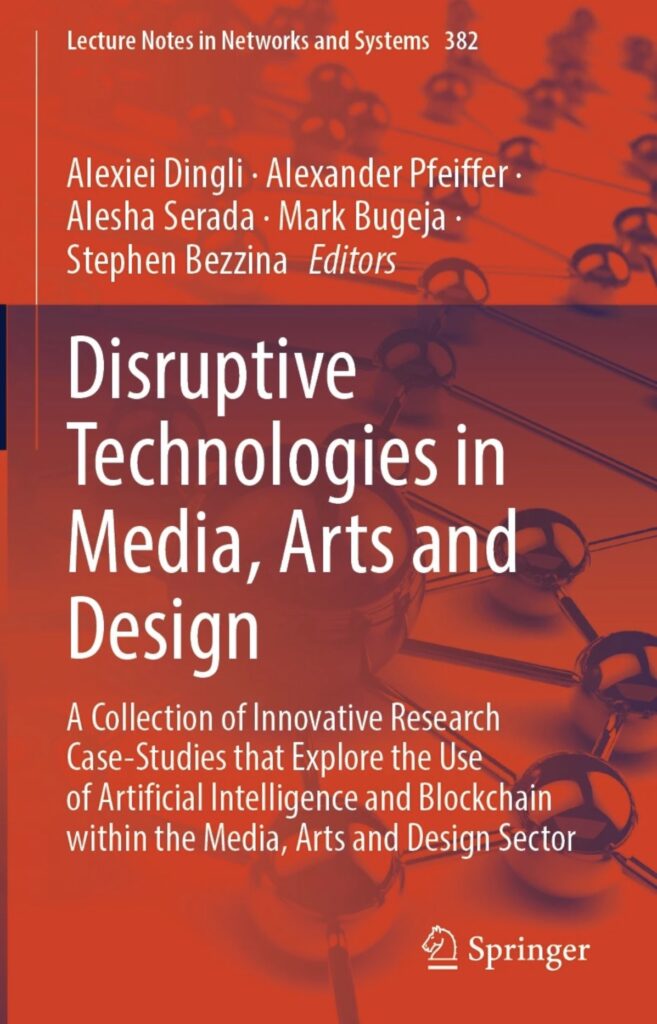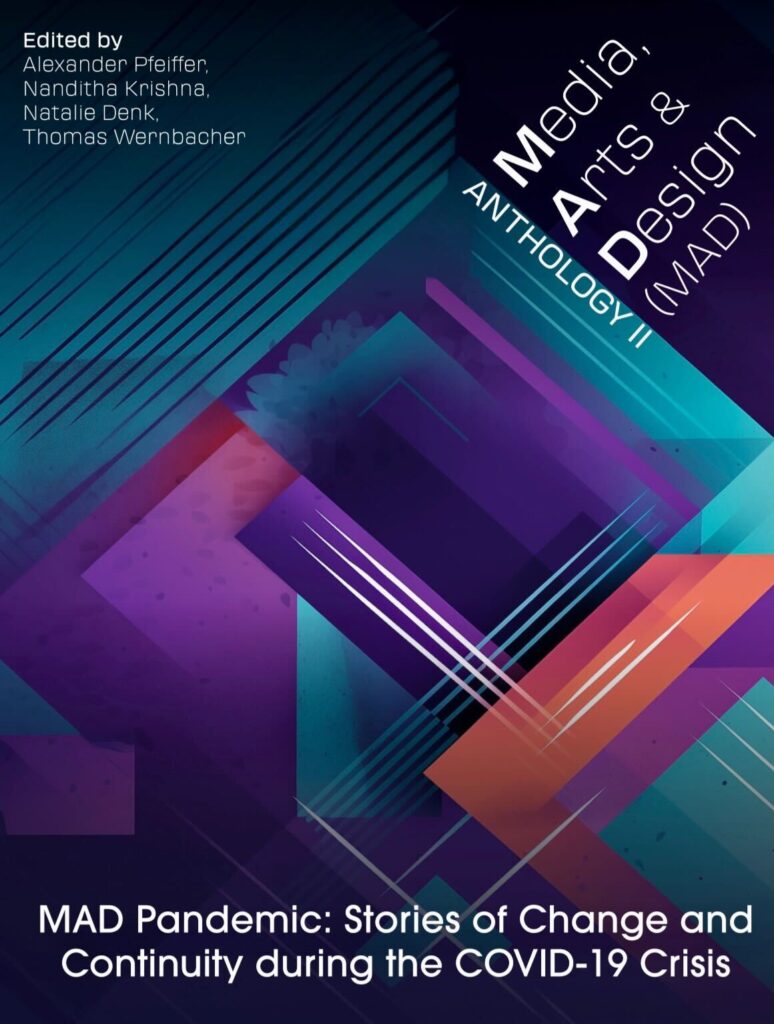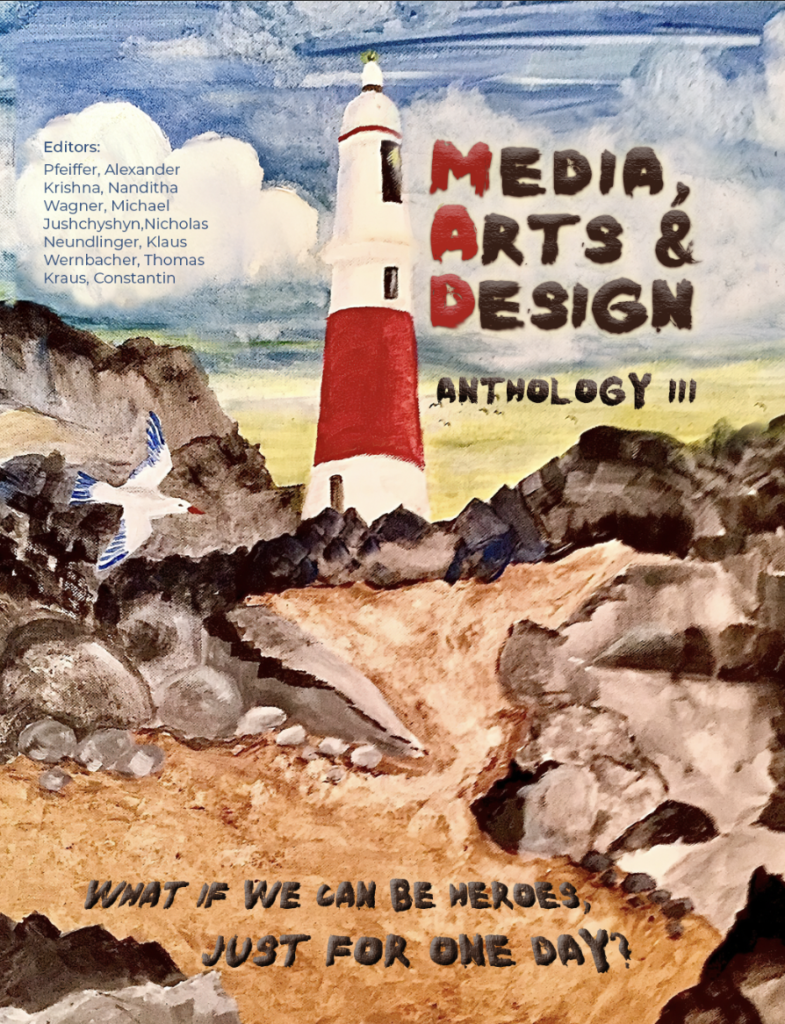MAD 2025 – The Year-Long Unconference
Video 24 MAY 2025 – Next Edition 06 December 2025: https://donau-uni.zoom.us/rec/share/kJt6HN4JXC35MpGDNfFQILuwix04-qh9etc22TBw-yjX3JcJKhmaK9eRsqHrrJ5U.FHqVfJ4NhP1PJbOo
Paper Template (for both formats, pick whatever you need, but keep the design):

SCHEDULE 6 DECEMBER 2025 – MEZ (UTC+1)
O N L I N E O N L Y (GOOGLE “TIME IN AUSTRIA / EUROPE” – https://www.timeanddate.com/worldclock/austria/vienna
Zoom Link: https://donau-uni.zoom.us/j/66428437858?pwd=Mbar7kh1F9a21VAlEPNTulntPpslP2.1
10:15 – 10:30 Virtual Cup of Coffee
10:30 – 10:55: Mateo Klanisek – SPANNUNGSFELDER DER RECHTS- & BIOETHIK ANHAND VON VIDEOSPIELEN (Talk in German)
11:00 – 11:25: Rudolf Thomas Inderst – Beyond the Ivory Tower: Pop-Philosophy as Public Scholarship in Game Studies (already published
11:30 – 12:00: Seyed Mohsen Mirmotahari – UNFOLDING DIGITAL DESIGN: A SYSTEMATIC REVIEW AND KEYWORD MAPPING ANALYSIS
12:00 – 13:00: Virtual Lunch Break
13:00 – 13:25: Marcelo Simão de Vasconcellos – The Mad, the Brilliant, and the Distracted: Representations of Scientists and Science in Digital Games
13:25 – 14:00: Discussion
14:00 – 14:25: Arefe Ahmadi – Embodied Creativity and the Limits of AI: A Conceptual Critique Through Artistic Practice
14:30 – 14:55: Gene Anthony Santiago-Holt – The Boricua Cyborg: Challenging the Binary Through the Cybernetic Being
Articles only:
Luca D’Ascari – Mirror Exposure Therapy (MET) in Virtual Reality (VR) for Body Image Disturbances (BIDS)
Gene Anthony Santiago-Holt – The Destructive Manifesto: Toward a Deconstructive Media Studies
Taras Yakovlev – Co-Creation or Delegation? Reassessing Artistic Control in Audiovisual Culture under Generative Intelligence
Daniel Meis – Wissen und Phantasie bei Lara Croft. Geschichtsbilder in Tomb Raider (2013) (already published)
Daniel Meis – Neubeginn oder Tiefpunkt? Die Rezeption des 2003 erschienen Tomb Raider: The Angel of Darkness (already published)
Mingyong Cheng, Kathrin Helen Fisher – A Cyborg’s Mirror. Exploring Posthuman Feminist Embodiment through a Cyborg-Choreographic Interface
Mateo Klanisek – KI IN SPRACHFÖRDERUNG UND MINT-FÄCHERN
Alexander Pfeiffer, Nanditha Krishna – Restoring Trust in the Age of Deepfakes: A Blockchain-Based Proposal : The Global Challenge of AI-Manipulated Media (already published)
Bernd Pfeiffer, Alexander Pfeiffer, Thomas Wernbacher – Gaming im Recruiting: Verkannte Potenziale oder überschätzter Hype?
Song Lulu – The Live Archive and Algorithmic Agency: Participatory Design for the Visual Empowerment of Stateless Narratives
Bryanna Miller – Simple Controls, Stronger Ties: The Role of Positive Play in Community Building Through Casual Games
AGS – 21 Years Center for Applied Games Studies 2005 – 2026
Call for contributions:
It begins the same way for almost everyone. You’re in Krems, Kalkutta, Valletta, or maybe Philadelphia—up too late, coffee cooling beside the keyboard—when a stubborn idea refuses to wait for the “real” conference season.
That jitter of urgency is exactly what MAD 2025 is built to catch.
This year, the Media, Art & Design community is trading the single-week spotlight for a twelve-month, always-open stage. Send your work the moment it’s ready; speak about it when the conversation needs you; publish it as soon as the reviewers nod. Our unconference never closes its doors.
Two ways to tell your story—both welcome 24/7
Opinion Papers let you step onto the page with your own accent and rhythm, whether it’s a 1 500-word flash of manifesto or a 6 000-word meditation on why generative music should smell like rain.
Peer-Reviewed Papers give rigour its due; short pilot or 8 000-word study, footnotes dancing with figures, refereed by scholars who understand that crossing disciplines is part of the method, not a flaw. The length serves the idea, never the other way around.
The rolling engine
Submit whenever inspiration strikes through the following forms
— https://forms.office.com/e/9GWr38GT0N.
Within a fortnight your piece meets its reviewers; you revise, we polish. The moment it’s accepted, it appears online in MAD OPINIONS 2025 with a DOI and a CC BY 4.0 licence. At year’s end every 2025 text is gathered into MAD Anthology IV, our continuing book series. No annual bottleneck—only the hush on 15 December when the volume closes and the presses warm up.
Two shared firesides
Pages can’t hold the afterglow of a good idea, so twice we gather on Zoom—first on 24 May 2025, then on 6 December 2025—with an open classroom in Krems for anyone who’d like to walk in. Speak for fifteen minutes before your paper is finished to test the waters, or after publication to stir the next wave of questions. Each talk is recorded and linked to your article’s page.
The heartbeat themes
“It’s all about you.”
This strand is for the project that lives in your backpack or on a hard drive labelled after hours. Maybe your university, museum, or agency can’t fund it—or can’t yet see the point—but you know it belongs in the conversation. We welcome essays and studies rooted in your core research field even when the day-job budget stops at 5 p.m. Bring the experiment you write on weekends, the reflection sketched between client calls, the dataset you keep polishing long after the grant ran dry. If it matters to you, it matters to us.
“Hey, that’s not my subject.”
Here the fun is in trespass. A film scholar models NFT market bubbles; a coder reinvents eco-poetry; a graphic designer probes urban sociology. Ship us the paper that raids another discipline’s pantry or the reflection that flips outsider status into insight. Crossing borders isn’t optional—it’s the whole point.
Feel free to drift between the currents: expand an It’s-all-about-you essay into a Hey-that’s-not-my-subject study, or pen a backstage opinion piece that accompanies your peer-reviewed crossover.
(For the record: MAD itself is a spare-time labour of love for the editors—so we understand “after hours” better than most.)
Costs, or rather the lack of them
We charge no processing fees. Publication is free, because curiosity shouldn’t come with a paywall. Plus: MAD is and was always community-driven. If you’d like to hold the anthology in your hands, a physical copy will be available at roughly the printing cost—about 25 USD.
Questions tapping at your window at 02:17 a.m.?
Write to alexander.pfeiffer @ donau-uni.ac.at—the light is on.
Ready to join? Submit here: https://forms.office.com/e/9GWr38GT0N
Full details always live at www.mad-conferences.com
Whether your next sentence begins with “It’s all about me” or “Hey, that’s not my subject”—start typing. Push Send. We’ll keep the unconference lights on.
MAD 2025. Speak when the spark strikes. We’re already listening.
SCHEDULE 24 MAY 2025 – MESZ (UTC+2); Classroom Krems: C 2.08
google: What is the time in Austria 😉
11:40 – 12:00 OPENING / CHECK-IN
Deutsch:
12:00 – 12:20 Ewald Staltner – Einsatz von KI in der Schule | Nutzungsvorschläge und Gefahren
12:30 – 12:50 Thomas Wernbacher – ESPORTS (Erasmus Projekt Vorstellung)
12:50 – 13:00 CHECK-IN ENGLISH ONLY PARTICIPANTS
English:
13:00 – 13:30 Mo Li – The Art Trap: Talent, Taste, and the Barriers to Artistic Success
13:30 – 14:00 Alesha Serada – How a Music Video Game Saved My Life (And How You Can Live Long and Prosper with Depression)
14:00 – 14:30 Stephen Bezzina – AI-enabled Gamification for Education
14:30 – 15:00 Alexiei Dingli – AI Won’t Replace You … But an AI-Powered Colleague Might
15:00 – 15:30 Wilfried Elmenreich – Reimagining Game Dialog: From Linear Scripts to Character-Centric Conversations
15:30 – 16:00 Kevin Mercer – Won with Nature: The Problem with Video Game Ecosystems
16:00- 16:30 Michael G. Wagner – We Are Not in the Driver’s Seat: How Post-Hoc Storytelling Shapes Minds—Human and Machine Alike
Your hosts: Alexander Pfeiffer, Nanditha Krishna, Thomas Wernbacher & Michael G. Wagner

History: Media, Arts and Design (MAD) Conferences 2020 – 2024:
Over the course of history, the evolution of the media, arts and design has dynamically mirrored society’s growth, advancements, and transformation, reflecting human aspirations, desires, and the ever-changing landscape of existence.
Since its inception in 2020, the Media, Arts and Design (MAD) conference series has successfully drawn significant contributions and attendance from people across the world. The year 2020 saw two versions of MAD, namely the Media, Arts and Design | Blockchain 2020 Conference and the Media, Arts and Design | AI 2020 Conference, effectively witnessing a perfect amalgamation of technical, scientific, cultural discussions and contributions.
Jointly organized by the Drexel University’s Department of Digital Media, supported by the Education Arcade at the Massachusetts Institute of Technology (MIT), the Learning Interactive Visualization Experience (LIVE) Lab at Texas A&M University, the Department for Arts and Cultural Sciences at Donau-Universität Krems, and the Conceptualizing Blockchain group at the University of Vaasa, the Media, Arts and Design | Blockchain 2020 conference was hosted online (due to the COVID-19 pandemic) by the Westphal College of Media Arts and Design at Drexel University in Philadelphia on the weekend of May 2-3, 2020. The conference aimed to explore Blockchain technologies and its impact on media, arts, and design.
The Media, Arts and Design | AI 2020 conference was organized by the Center for Applied Game Studies at Donau-Universität Krems, the Department of Artificial Intelligence at University of Malta and the Department of Digital Media at Drexel University. The conference was further supported by the MIT Education Arcade at the Massachusetts Institute of Technology, the LIVE LAB the Texas A&M University and the Department of Communication Studies at the University of Vaasa. The conference took place on June 19th, 2020, and explored the intersections of Artificial Intelligence (A.I), and media, arts and design.
In 2020, the 6th International Conference on Cyber Security and Privacy in Communication Networks (ICCS) included a special track organized by the MAD team with support from Thomas Gabriel Rüdiger. The track was based on the theme of cybercrimes in the field of game-studies and saw a variety of discussions on topics such as avatar and identity theft, misuse of credit card data, misuse of virtual goods, setup of pirate servers, terrorism planning through game chats, money laundering, Distributed Denial of Service (DDoS) attacks via games, sex offences, grooming in game chats, mobbing, and insulting offences.
On December 8, 2021, a special edition of the Media, Arts and Design Conference MAD | 21 – THE FUTURE OF MEDIA, ARTS, AND DESIGN was held, exploring the metaverse, non-fungible token (NFTs), Blockchain technologies, visualizing what the future looks like for the fields of media, arts, and design.
In 2022, we published our first anthology titled Disruptive Technologies in Media, Arts, and Design – A Collection of Innovative Research Case-Studies with Springer. Theanthology examined the use of technologies such as Artificial Intelligence (AI) and Blockchain within the media, arts and design sectors.
Also, in 2022, the Media, Arts and Design Conference, in its 4th edition, got to the heart of Emergent Technologies (Decentralized Networks, Artificial Intelligence, Virtual Worlds – Metaverse, Virtual and Augmented reality to name a few) in the domains of media, arts, and design. It took a wide-ranging look at how the impact of emergent technologies in the fields of media, arts, and design evolved socially, economically, and politically during times of crises such as the COVID-19 pandemic, simultaneously exploring the impact of these technologies in our personal lives. Hosted by Alexander Pfeiffer, Natalie Denk, and Michaela Wawra (University for Continuing Education Krems); Scot Osterweil (The MIT Education Arcade); Stephen Bezzina, Alexiei Dingli (University of Malta), Michael Wagner, Nick Jushchyshyn (Drexel University), Simone Kriglstein (Masaryk University and AIT Austrian Institute of Technology), Klaus Neundlinger (Institute CE) and André Thomas (Texas A & M University), the conference stood out for its unique position paper tracks, wherein talks explored how communication and interaction in private as well as professional lives have changed over time due to emergent technologies.
In July 2023, we co-organized a multidisciplinary summer school event VARIATIONS ON HOW TO PLAY at the University for Continuing Education Krems, encompassing a broad range of discussions on topics delivered through diverse formats. The event delved into the impact of satellite traffic in space, utilizing Virtual Reality to enhance awareness, and provided unique outdoor learning experiences for children. Attendees explored the evolving landscape of Cinematic Virtual Reality and experienced the expressive power of language within improvisational theater. A workshop provided a deep dive into the complexities and challenges unique to filmmaking in China, enriching the event’s offerings. The conference day further expanded the discourse, addressing the transformation of speech acts, considerations for interactive literature exhibitions, the gamification of statistics, and the integration of AI in media, arts, and design. The event inspired the launch of DJAKK, or Digitales Journal für Angewandte Kunst und Kultur (www.dac-journal.at) by the Department for Arts and Cultural Studies, a significant milestone in advancing the discourse in culture and the arts, with its inaugural issue published in mid-2024.
Media Arts and Design (MAD) 2024
The Media, Arts and Design (MAD) 2024 Conference explored the human elements, specifically the potential of individuals within the MAD community to enact meaningful changes, leaving significantly lasting impacts on the world.

————
MEDIA, ARTS AND DESIGN (MAD) | ANTHOLOGY II
MAD Pandemic: Stories of Change and Continuity during the COVID-19 Crisis (OPEN ACCESS)

————
MAD Anthology III: What if we can be heroes, just for one day? (OPEN ACCESS)

————

————
The Past (speakers list, abstracts and link to recordings)
MAD 2020 – Artificial Intelligence (AI)
MAD 2021 – the future of media, arts and design & special edition on cybersecurity
MAD 2022 – emerging technologies in times of a crisis
MAD 2024 – What if we can be heroes, just for one day
Further Links (MAD co-organisers in the present and past)
Center for Applied Game Studies at University for Continuing Education Krems
Emerging Technologies Experiences Lab at University of Continuing Education Krems
Department of Digital Media at Drexel University
Department of Artificial Intelligence at University of Malta
MIT Education Arcade at the Massachusetts Institute of Technology
LIVE LAB the Texas A&M University
Department of Communication Studies at the University of Vaasa
